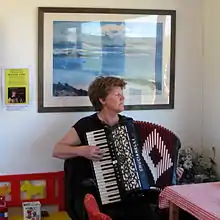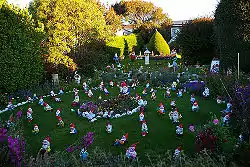Culture of the Falkland Islands
The culture of the Falkland Islands is essentially analogous to that of British culture.[1] The Falkland Islands have a large non-native born population, mainly white and from England (and to a much lesser extent, other parts of the British Isles), but also from Saint Helena.[2]

The native born population is mainly of English descent, with other strains such as Gibraltarian.
Language
The English language is used, mainly in its British English form. However, due to the isolation of the islands, the small population retains its own accent/dialect. In rural areas (i.e. anywhere outside Port Stanley), known as "Camp" (from Spanish campo, "countryside"), the Falkland accent tends to be stronger. The dialect has resemblances to Australian, New Zealand, West Country and Norfolk dialects of English, as well as Lowland Scots. Other notable Falkland island terms are the words "kelper" meaning a person who lives in the Falklands, etymologically, the term comes from the kelp surrounding the islands (although this term is sometimes considered pejorative); and "smoko" referring to a smoking break.[3]
The official language of the Falkland Islands is English, and other spoken languages are Lowland Scots, Spanish (mostly spoken by Chileans, with some Spaniards), French, and historically Yaghan.[4]
Literature
- For the culture inspired by the Falklands War, see Cultural impact of the Falklands War
Due to the low population of the islands, most of the literature of the islands has been written by outsiders, and is non-fiction. However some poetry has been written by Falklanders, including Ernest Spencer's Motherland.
Architecture
The 1911 Britannica states:
- The houses [of Stanley], mostly white with coloured roofs, are generally built of wood and iron, and have glazed porches, gay with fuchsias and pelargoniums. Government House, grey, stone-built and slated, calls to mind a manse in Shetland or Orkney. The government barrack is a rather imposing structure in the middle of the town, as is the cathedral church to the east, built of stone and buttressed with brick.
The government barrack is now a guesthouse and is somewhat more in keeping with the surrounding houses.
Since this date, many more buildings have been erected in Stanley. In 1998, the Government of the Falkland Islands started a programme to encourage building of private houses, the development is known as East Stanley as it developed Stanley to the East. This led to a boom in the housing construction market with many new timber kit houses imported, largely from Scotland. These range from single bedroom bungalows to large 4-5 bedroom houses, the style of cladding and colours varying immensely.[5]
Falkland houses are renowned for being brightly painted with immaculately maintained gardens, older houses frequently have intricately carved wooden fascia boards.
The Bodie Creek Suspension Bridge is sometimes stated to be the most southerly in the world.
Miscellaneous

There is one major newspaper, the Penguin News[6] and also a radio station the Falkland Islands Radio Service (FIRS).[7] The islands also have their own national football team and national cricket team.[8]
References
- "Our People | Falkland Islands Government". www.falklands.gov.fk. Archived from the original on 2019-03-23. Retrieved 2019-12-09.
- "Ascension | island, Atlantic Ocean". Encyclopedia Britannica. Retrieved 2019-12-09.
- "Kelper Tours - Visitor Information". www.falklandislands.com. Retrieved 2019-12-09.
- "Falkland Islands's Languages - GraphicMaps.com". www.graphicmaps.com. Retrieved 2019-12-09.
- "Falklanders: We are the luckiest working-class people on earth". The Independent. 2012-01-22. Retrieved 2019-12-09.
- Tyzack, Anna (2012-05-25). "My perfect weekend: Lisa Watson, editor of Penguin News, Falkland Islands". ISSN 0307-1235. Retrieved 2019-12-09.
- "Falklands Radio - Home". www.radio.co.fk. Retrieved 2019-12-09.
- Strack-Zimmermann, Benjamin. "Falkland Islands (2019)". www.national-football-teams.com. Retrieved 2019-12-09.
External links
- Falkland Islands Poetry
- Falkland Islands journal
- Falkland Islands Conservation
- Falkland Islands Museum and National Trust
- Falkland Islands Shackleton Scholarship Fund